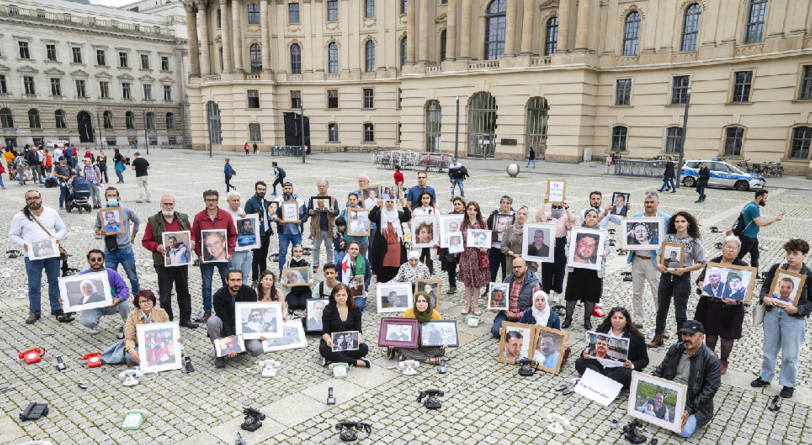
Amnesty International called on the Syrian government Aug. 29 to undertake concrete measures, including a nationwide search for tens of thousands who disappeared under the Assad regime, to deliver truth, justice and reparations for the victims and their families. A new report published by the human rights organization finds that thousands of individuals are still struggling to uncover the whereabouts of their family members, many of whom are believed to have been subject to torture, murder, and other human rights abuses.
Over the years of the autocratic regime led by the ousted president Bashar al-Assad, an estimated 100,000 individuals disappeared. Most of the perpetrators responsible for illegal detentions and human rights abuses have never been held accountable, and many have fled the country.
On May 17, the National Commission for the Missing (NCM) was created by Presidential Decree No. 19 to investigate the “fate of missing and forcibly disappeared persons” and to establish a national database to provide citizens and affected family members with accessible information and humanitarian support. According to the NGO Syria Accountability, however, the NCM will only have a humanitarian function, and the evidence collected will not be used in criminal prosecutions.
Deputy regional director for the Middle East and North Africa (MENA) at Amnesty International, Kristine Beckerle, said:
Truth, justice, and reparations for Syria’s disappeared must be treated as an urgent state priority, including through ensuring the independence of the newly established National Commission for the Missing (NCM) and providing it with adequate resources and the highest levels of cooperation across all state institutions. With each day that passes, the torment of families waiting for answers about the fate and whereabouts of their loved ones grows.
Amnesty demands the NCM maintain full alignment with international standards, in particular the UN Guiding Principles for the Search of Disappeared Persons, which mandate an autonomous and government independent nature of the search. In particular, the Syrian government, led by transitional president Ahmed al-Sharaa, needs to ensure the mandated independence of the commission, and enshrine into law Principle 7 of the UN Guiding Principles (on the obligation to search for disappeared persons),
In addition, Amnesty stated that alongside “full and adequate reparations for all victims of crimes,” the government must ensure an impartial investigation into all crimes under international law and prosecute suspected perpetrators, regardless of their affiliation, and without recourse to the death penalty.
From JURIST, Sept. 1. Used with permission.
See our last report on the Assad regime’s crimes.
Photo: Rally for disappeared in Syria, Berlin 2021. Credit: Paul Wagner/The Syria Campaign via ResearchGate





Syria issues arrest warrant for Bashar Assad
Syrian authorities have issued an arrest warrant for the ousted president, Bashar al-Assad, a judge announced Sept. 27. The investigating judge said that the charges concern 2011 repression in Daraa, and include “premeditated murder, torture leading to death, and deprivation of liberty.” The report states that the judicial decision “opens the door” to Interpol cooperation in pursuit of the case. (Jurist)
Syria: international support needed in locating disappeared
The head of the Independent Institution for Missing Persons in Syria (IIMP), Karla Quintana, stated during a press conference on Oct. 8 that finding the thousands of Syrians who disappeared under the Assad regime requires a collective international effort.
Quintana warned that time is running out, and locating the missing urgently requires the support of the international community. At the UN’s New York headquarters, she warned that the “crisis of the missing in Syria affects not only hundreds of thousands of families, but entire communities on the whole Syrian society.” She urged that “comparative experience” and the mobilization of “every available skill, resource, and capacity” are necessary to achieve the IIMP’s mission.
A major challenge to the IIMP’s efforts, according to Quintana, is the uncertainty of records. The IIMP cannot confirm exactly how many Syrians have disappeared, and relevant records are difficult to obtain. The UN has clarified that the “conflict has made many areas inaccessible, records may be incomplete or destroyed, and some regions remain unstable and dangerous to work in.”
The UN-established IIMP serves to help Syrian families locate their relatives, and “find the truth” about their disappearances. The IIMP also provides legal assistance and psychological support to families of missing loved ones. (Jurist)
Syria arrests ex-military official for Assad-era atrocities
Syrian authorities have arrested a former military official, accusing him of being responsible for the execution of civilians at the Assad regime’s notorious Sednaya prison. Major General Akram Saloum al-Abdullah is said to have commanded the military police from 2014-2015, and is believed to be the highest ranking person arrested to date over the atrocities committed at Sednaya, which has been called a “human slaughterhouse.” (TNH)